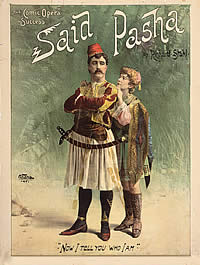 |
 |
||||||
"Said Pasha" - The Argument.
 |
The comic opera success Said Pasha by Richard Stahl, c. 1889, |
The Scene of the first act is at Constantinople. Said Pasha, a Turkish Diplomat, is preparing for a pleasure trip around the world. Serena, his daughter, is anxious to accompany him because she does not want to he parted from her lover, Hassen Bey, who is the Pasha's first officer. The Pasha, who does not favor this attachment, forbids her. Meantime, there are a couple of adventurers introduced, Hadad and Nockey. Hadad, in search of his daughter, stolen from him in India when a baby seventeen years before, desires to reach that country, which he finds to be the Pasha's first destination. Instructing Nockey to personate an idiot brother (with a vocabulary limited to the interrogation "Why?") whom he is desirous of taking to a certain shrine in hopes of his recovery, Hadad asks that they may be of the party, to which the Pasha consents. Then becoming aware of the dilemma of Hassen Bey and Serena, Hadad endeavors to establish a claim on them by suggesting that Serena shall disguise herself as a sailor and thus accompany her lover. During the preparation for this scheme, finally carried out in spite of the Pasha's suspicions, there arrives a rich young Mexican, Terano, in search of the ideal woman of whom he has dreamed. The Pasha, with an eye to business, parades the ladies of his harem, hoping to sell one of them, and even sends for his daughter, considering the Mexican a desirable son-in-law. But Terano, still unsatisfied, accepts an invitation to go to India with the Pasha, who hopes to arrange there a match that may be to his own advantage, and the curtain falls as the ship sails away with all the principals on board.
The scene for the second act is laid in the village of Altara, India. For several months, Alti, the adopted daughter of the Rajah of Altara has been afflicted with some psychologic ailment, which baffles the skill of the local learned men. Hadad and Nockey appear on the scene. Overhearing the Rajah lamenting, they conceive the idea of offering their services as doctors. The Rajah accepts their offer, but has them watched. In attempting to leave Altara they are seized, and are about to be put to death, when the arrival of the Pasha and the rest of his party creates a diversion in their favor. The Rajah is made to believe that the Pasha is a famous expert in Psychology - and claims his services for Alti. Terano recognizes in Alti the face of his dreams; Alti in Terano a preordained spirit, whom she had met in her astral form. The Pasha is very much taken with Alti's beauty, and in trying to gain an interview, meets Balah Sojah, the Rajah's sister, a very susceptible creature of uncertain age - who has blossomed into the "sere and yellow leaf" of single blessedness on account of the vacillating character of her affection. The Pasha, being near-sighted, makes violent love to her, mistaking her for Alti. Hadad and Nockey, upon whom Balah has previously lavished her affection, overhear the interview, and upon the announcement of her enormous wealth, enter the lists with the Pasha for her hand. The Pasha, whose exchequer has become depleted, is anxious to gain her for himself, and upon her announcement of her inability to choose between them, commands the withdrawal of Hadad and Nockey, and on their refusal, makes things unpleasant for those worthies. The Rajah is informed of the true character of his distinguished guest, and is only too happy at the prospect of such a brother-in-law. Hadad and Nockey are given twenty-four hours in which to seek partners for their joys and sorrows. The presence of Terano recalls Alti from her "spirit life." Hadad discovers in Alti, his long lost daughter, but is afraid to disclose the fact to the Rajah. Alti prevails upon the Pasha to give his consent to the marriage of Serena and Hassen Bey.
A celebration is given in honor of Alti's recovery. Hadad and Nockey "meet the enemy" and are forgiven. The Pasha invites the Rajah to accompany him to Constantinople, and preparations are begun at once for a speedy departure amid general wishes for a long life to Said Pasha.
American Musical Theatre | Said Pasha
Page modified 21 February 2017